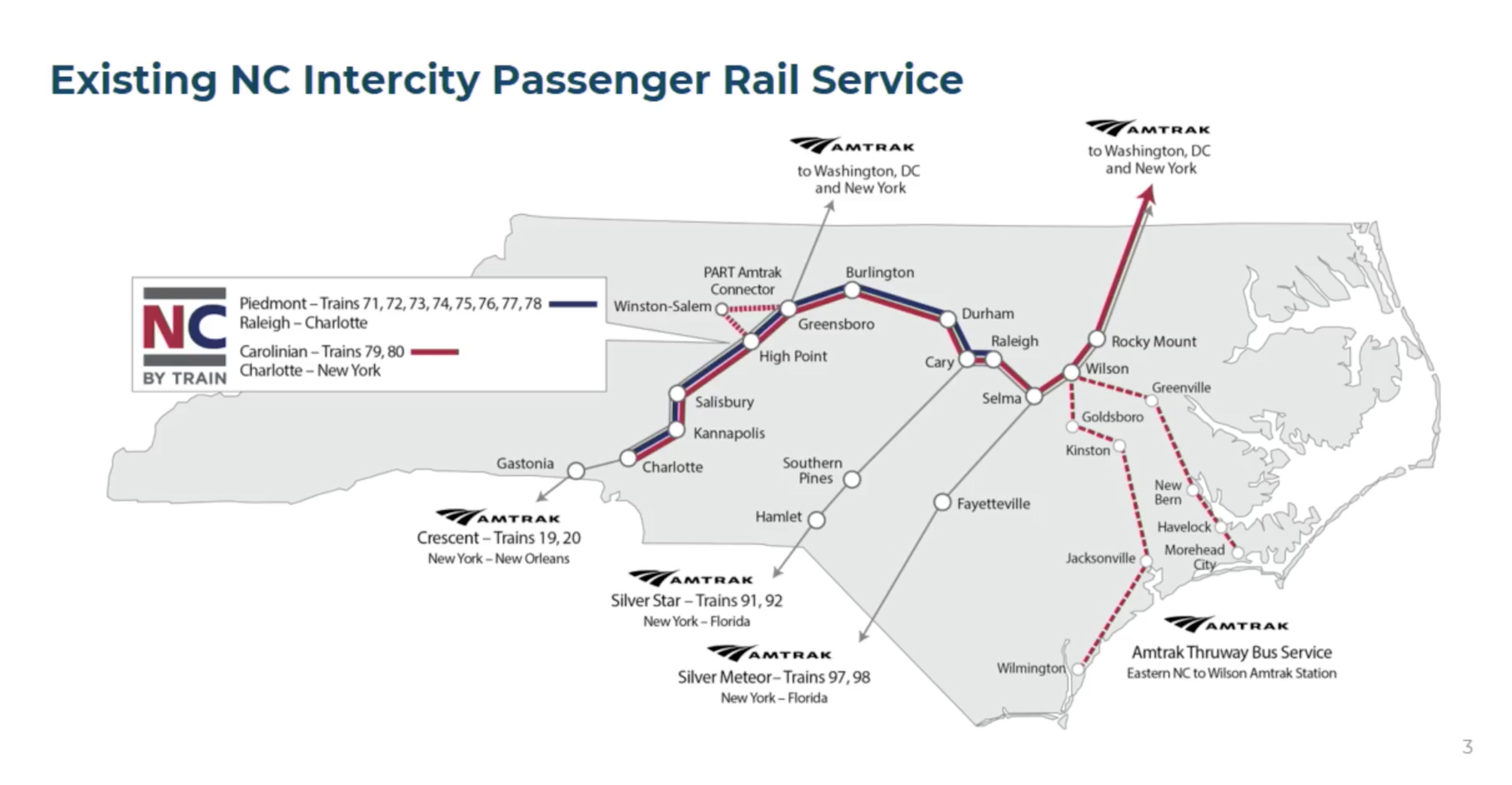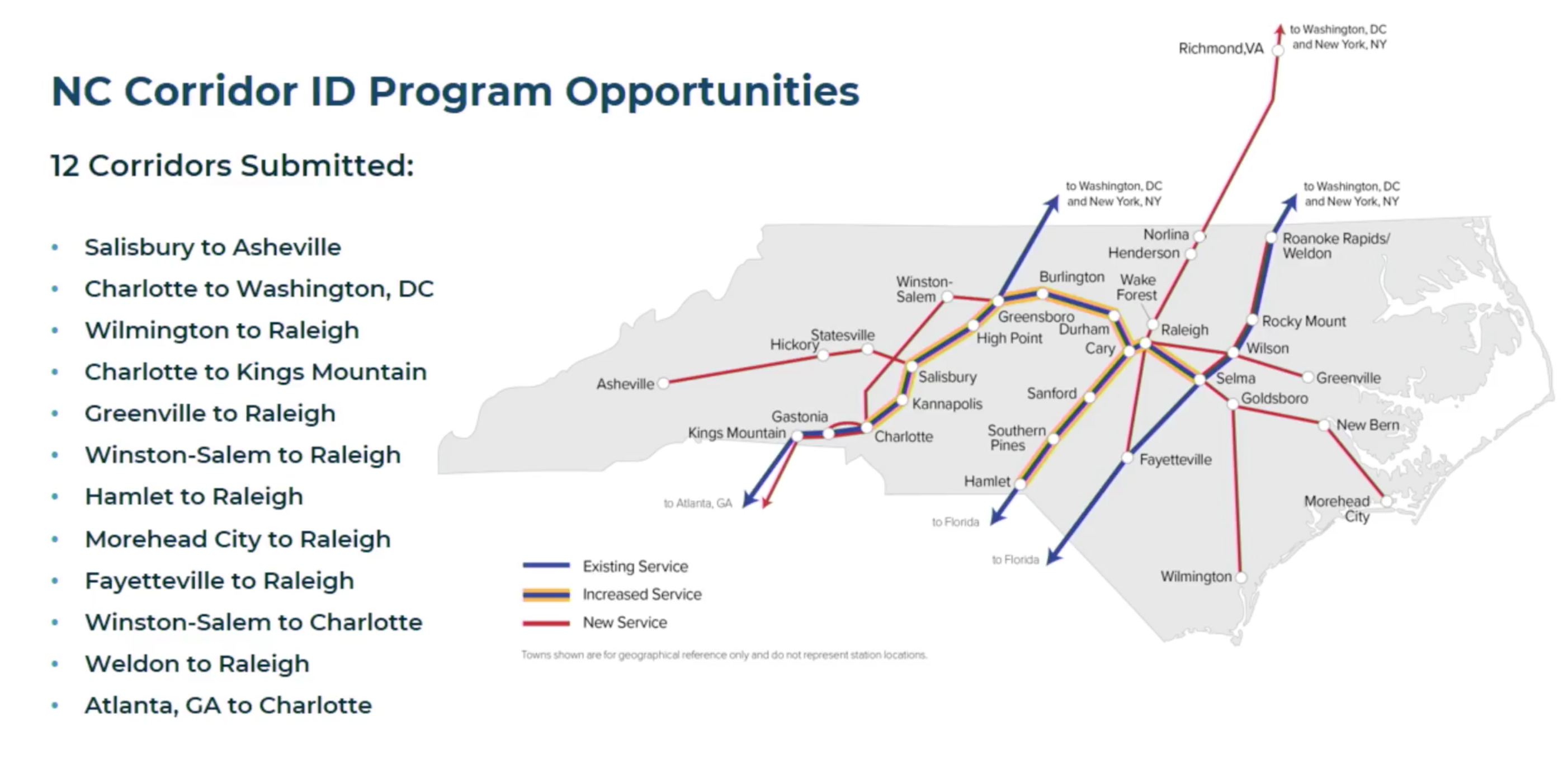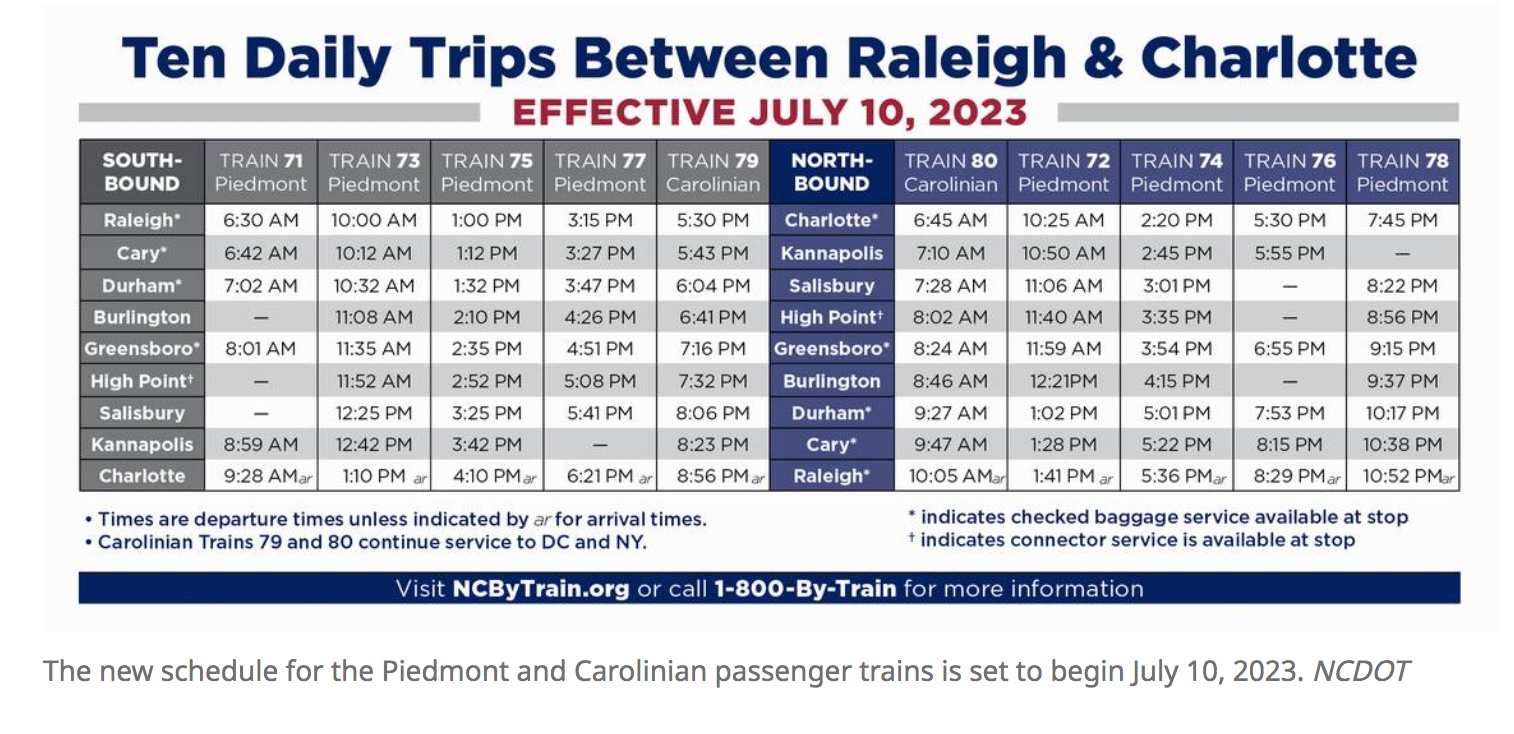Off the rails: Salisbury adapts to new train schedule
Published 12:05 am Saturday, October 7, 2023
SALISBURY — Since July 10, the Salisbury Station on Depot Street has undergone major changes to its Amtrak train schedule. The morning southbound Piedmont train that travels through Salisbury from Raleigh heading to Charlotte no longer has its usual stop in the city at 8:53 a.m. The earliest any train arriving from Raleigh is now after noon. The northbound Piedmont train has added an 11:06 a.m. stop, but it replaced its 3:56 p.m. stop from Charlotte to Raleigh with one on 3:01 p.m. After that, the next northbound rain leaving Salisbury isn’t until 8:22 p.m.
This means people who rely on that morning southbound stop to get to work outside of Salisbury will not be able to leave in the morning, causing problems amongst residents. These changes were made by the North Carolina Department of Transportation after examining methods to improve the on-time efficiency of the statewide train schedule. The NCDOT found that demand for the trains were mostly in the afternoon.
“The amount of trains that we have between Raleigh and Charlotte is comparable to the most busy locations in the country,” NCDOT Rail Division Director Jason Orthner said at the Aug. 1 Salisbury City Council meeting where he spoke and answered questions about the adjustments.
According to NCDOT’s data, daily on and offs in Salisbury for the first morning stop was approximately 3.7, meaning less than two people got off or on in Salisbury on train 73 from Raleigh, which is a low amount. The NCDOT’s rail division collaborated for about a year with railroad partners Amtrak and freight railroads to produce the modified schedule.
Freight railroad companies manage and control the train schedules. Before a final plan was set, several scenarios were considered. Even though NCDOT did release the updated schedules following final approval, Salisbury was not notified of the shifts until a public comment session during the June 6 city council meeting. In response to that, NCDOT has said they are “committed to communicating with Salisbury during the railroad approval process for future schedule changes.”
Both freight and passenger trains utilize Salisbury, which limits train schedules at certain times. Salisbury and Kannapolis each have one platform under operation, but City Engineer Wendy Brindle says both cities will be getting a second one.
“Getting the second platform is so that the corridor can have more flexibility. Once we are able to load passengers from both sides of the track that opens up a lot of opportunity for freight and passenger to share and add on additional trains and schedules,” Brindle said. “As we work towards these projects and once we get the second platform, hopefully, that will open up opportunity to have even more stops and more times through here.”
For Brindle, she recognizes the frustration passengers are dealing with, but also why NCDOT made these kind of alterations in the first place.
“From an engineering standpoint, I definitely understand the logistics of trying to schedule freight and passenger and currently we’re limited to only loading from one side as is Kannapolis for our passengers. I know it has to be challenging and as we speak with DOT, we’ve just tried to emphasis the importance to Salisbury of having the availability of an earlier stop,” Brindle said. “They have to look at freight schedules, they have to look at stops and other communities and how those are scheduled.”
Prior to the June 6 meeting, Mayor Karen Alexander expected NCDOT to share their findings while they were contemplating the decision to get rid of the stops.
“Sometimes data alone isn’t sufficient to take in consideration all of the institutions, businesses and community passengers and how that will affect their daily lives. I was disappointed in terms of that and I thought that they would have shared that with these various community advocates and committees that are working on connecting our citizens with transportation,” Alexander said. “I felt blindsided as a community leader.”
The southbound train losing its 8:53 a.m. stop affects the entire county from a tourism standpoint. Executive Director of Rowan County Tourism Development Authority James Meacham says people coming from Raleigh can not get to a Rowan County event like the Cheerwine Festival or Polar Express in the morning and spend an adequate amount of time here. The three-hour window that the schedule now creates does not make sense for visitors arriving in Salisbury. Meacham said that losing the stop is “detrimental.”
“It took away an artery into the area. Even if there were only 10-15 people per day using that particular stop, we look at that as anywhere from 3,600 to 4,500 people a year. That’s a lot of folks losing an ability to come in and out of the community,” Meacham said.
The biggest concern was the loss of the southbound service from Raleigh to Salisbury, specifically for the time of day. Visitors will not arrive in Salisbury for an event until the afternoon and have only three hours to stay or wait until after 8 p.m., which families with children may not see as viable. They could come the night before and leave the next day, but that isn’t always financially realistic for some.
“It’s not practical to normal travel schedules,” Meacham said.
NCDOT and Rowan County Tourism’s marketing teams are now focusing on special events and methods to increase ridership and “use that as a platform to explore stops in the future.”
When it came to these kind of events, NCDOT said that they will work with cities on special stops to accommodate events such as the Cheerwine Festival. NCDOT will review events and travel demand at Salisbury for both special stops and future train services.
In order for people to come to the events in spite of the compressed train schedule, Meacham thinks incentivizing customers with discounts or cash back offers can be a stepping stone towards getting them to Salisbury. In the short term, Meacham is trying to get people to “think differently.” If a person wants to come to an event on Saturday, instead of getting in the same day, they can arrive the night before and leave Saturday, but they understand not everyone can financially do this.
Looking ahead to the long term, Meacham believes it is crucial for visitors to have an “easy booking process,” but doesn’t want to “rush” anything. He wants Tourism and NCDOT to piece together how Salisbury and the county can provide transportation to get people from the stop area to the event.
“I like the idea of Cheerwine Festival being that big launching point from our end to do this. Simply because it’s largely a national brand, it’s a very well known brand in North Carolina, it’s extremely well attended. Since it has that name recognition and by nature it’s kind of a day event, it’s a great event to come in, experience and then take a train back.”
Ted and Cheryl Goins were surprised to hear about the train changes through other people. Salisbury residents and owners of Pottery 101 on South Main Street, the Goins’ are worried about the potential trouble veterans will experience when accessing the Salisbury VA Medical Center.
“Not many towns have a VA center, so you would think that would be a prime reason for the stop,” Ted said.
They, like other Salisbury residents, think the community needs this stop. Given that Livingstone and Catawba Colleges are within city limits, students and faculty that could be affected by this, making this cross-generational issue. The Goinses wrote a letter to the city council about their concerns and “very much appreciate” how they have reacted to the changes, but still believe more can be done.
“We want our two stops back and maybe another one. At least let’s talk before any change is made. We ought to have that conversation and assess,” Ted said.
Alexander has heard from residents and empathizes with their frustrations.
“We won’t stop our advocacy because we feel like with the growing number of jobs and workforce development that is happening…Transportation by train will be very important in my estimation as we go forward,” Alexander said.
Alexander says she was “impressed” with NCDOT’s presentation on Aug. 1, but also knows others were not happy with what they had to say. Still, she thinks having the right mindset from now on is the key to fixing the situation.
“When things go wrong, we can’t stay in the challenge mode or in the negative mode. What we have to do is move forward with solutions and an emphasis on, how do we move forward from here?” Alexander said.
When it comes to projects that are in progress, Salisbury has been chosen as the city that could potentially connect to Asheville by train for the proposed Western N.C. Rail, a major undertaking with significant implications. It is one of the 12 corridors included in the overall grant requests submitted by NCDOT Rail Division. Final approval for all 12 corridors will be announced by the end of the year.
“We certainly are thrilled,” Alexander said. “That acknowledges the importance that NCDOT feels about the relationship with Salisbury.”
It appears the train schedule for Salisbury will have people adapting on how they commute. While there are projects and developments on the horizon that will greatly benefit Salisbury and the people living here, the current scenario has no quick resolutions. There are expectations for fixes in the future, but for now, these stop changes are the new normal in Salisbury.
*This article has been revised for accuracy.







